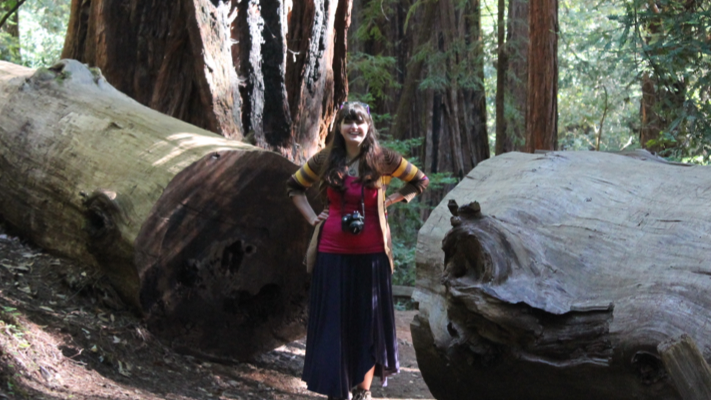Researcher Spotlight – Devon Gaydos

Spring 2018 Global Change Fellow
PhD Student, Department of Forestry and Environmental Resources
Advisor: Dr. Ross Meentemeyer
Every year the Southeast Climate Science Center funds a multi-disciplinary cohort of Global Change Fellows representing colleges across NC State University. Here are some highlights about Spring 2018 Fellow, Devon Gaydos, and the applied research she’s conducting.
About You
What do you study?
I’ve been studying sudden oak death disease, an invasive forest disease causing significant environmental damage along the Pacific coast. I’m using geospatial models of disease spread to help plan management strategies and engage stakeholders.
What (or who) influenced you to go into this field of study?
I’ve always been interested in biology and ecology. The further I got into these fields, the deeper I appreciated the world around me. But I also became increasingly concerned about the environmental degradation happening worldwide. I felt it wasn’t enough to just study the ecology and biology anymore. I wanted to help people make better long-term choices about how to manage the landscape. Geospatial analytics can be a great tool for exploring different policy and management scenarios to find more ecologically sustainable solutions. I was very fortunate to be given the opportunity to explore how geospatial analytics can be used to support decision making in the case of a persistent environmental problem, forest diseases.
What do you think is the most pressing issue related to global change?
I think it’s the way our society tends to view nature. A lot of people see society and nature as two opposing forces in conflict. But they aren’t. The health and functioning of our global society is intertwined with the health and functioning of the global ecosystem. To be fair, a lot of people already have this view, but I don’t believe it has been translated into the policy and actions necessary to avoid the worst impacts of global change.
What is your dream job?
I would love to work in a job that allows me to continue working directly with stakeholders to address pressing environmental issues.
About Your Research
What is the most important thing that you’ve learned?
I’ve learned a lot about working with diverse perspectives. As an ecologist, I tend to see things from a forest-health environmentalist perspective. But the further I’ve gotten into my work, the more I’ve realized that you need to try to see the environment through the different lenses of the people who live and work in it. Everyone in our study system has a unique relationship to the forest, and these diverse opinions are valid. The interesting challenge is then how to manage the landscape with these competing opinions in mind.
Who will benefit from your research?
My work is tailored towards working with and providing decision support for forest managers battling sudden oak death in Oregon. My hopes are that these model results can be used to help steer managers towards more sustainable solutions for disease management, both in the case of sudden oak death and for inevitable future forest diseases and pests.
How can your research be used to inform management decisions?
My whole project is geared towards developing and testing a decision support framework for forest disease management. My hope is that this framework will be useful both in the case of sudden oak death, and in other forest health problems worldwide.
How would you describe your research to a 3rd grader?
Just like humans, trees can get diseases and die. When you have just a few trees dying here and there, it’s not really a problem. But sometimes you get epidemics that wipe out large numbers of trees at once. When this happens, it can be really damaging to the forest ecosystem and can have negative impacts for the humans living in and around those forests. What I’m doing is using simulations of disease spread to help people better manage forest epidemics.
About Your Global Change Fellow Experience
How do you expect the SE CSC Global Change Fellows Program to impact you and your work?
The aspect of the Global Change Fellow Program that I was most drawn to was the science communication training. My favorite public figure of all time is Dr. Carl Sagan, a renowned astrophysicist and science communicator. In his show, Cosmos, he managed to make even the most complex and obscure scientific concepts relatable and understandable, and in doing so, he inspired millions of people. I think there’s a lot of power in that. I’m excited to tap into the expertise at the Southeast Climate Science Center to learn how to communicate my results so that they have the greatest impact possible.
- Categories:
